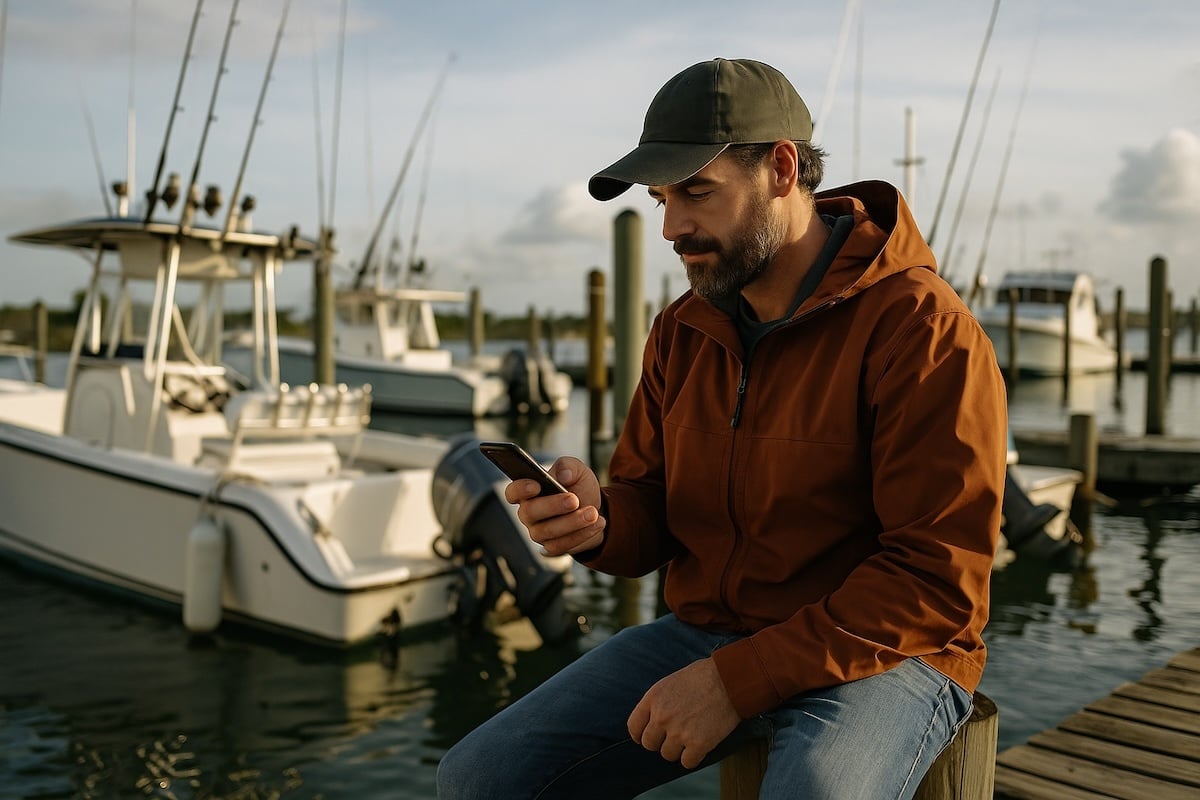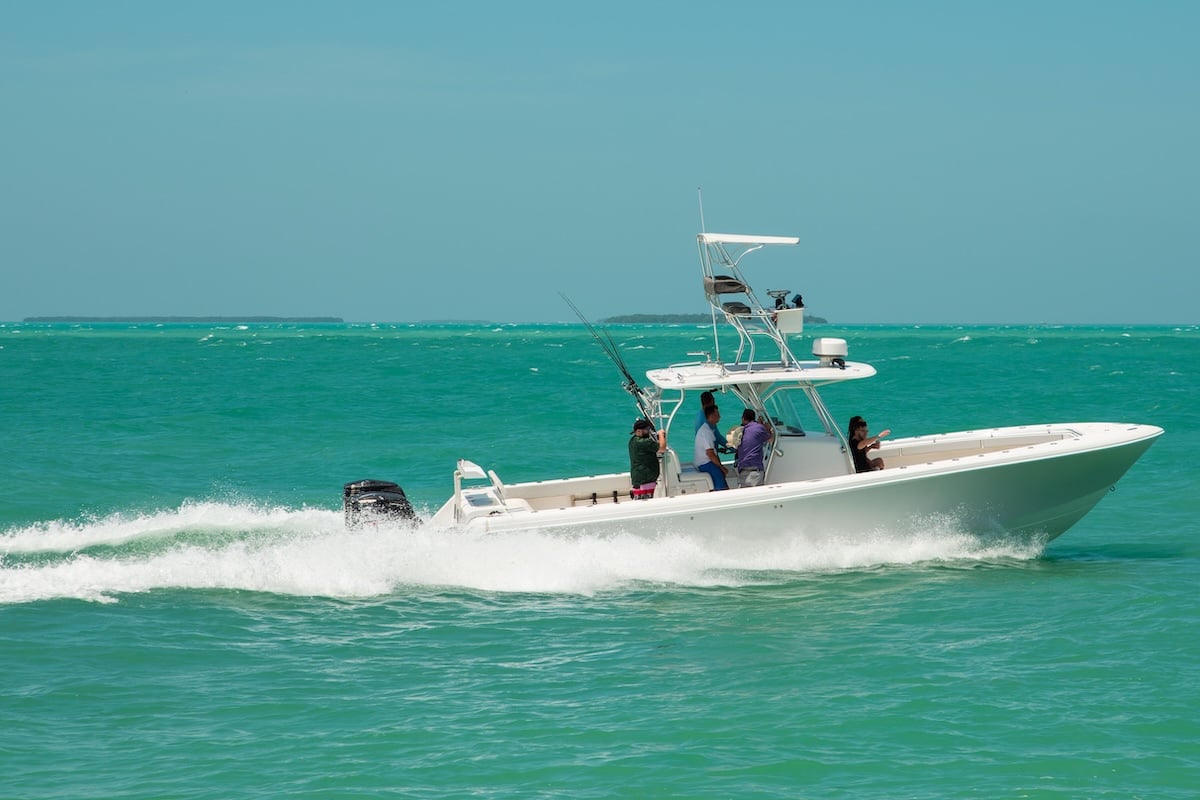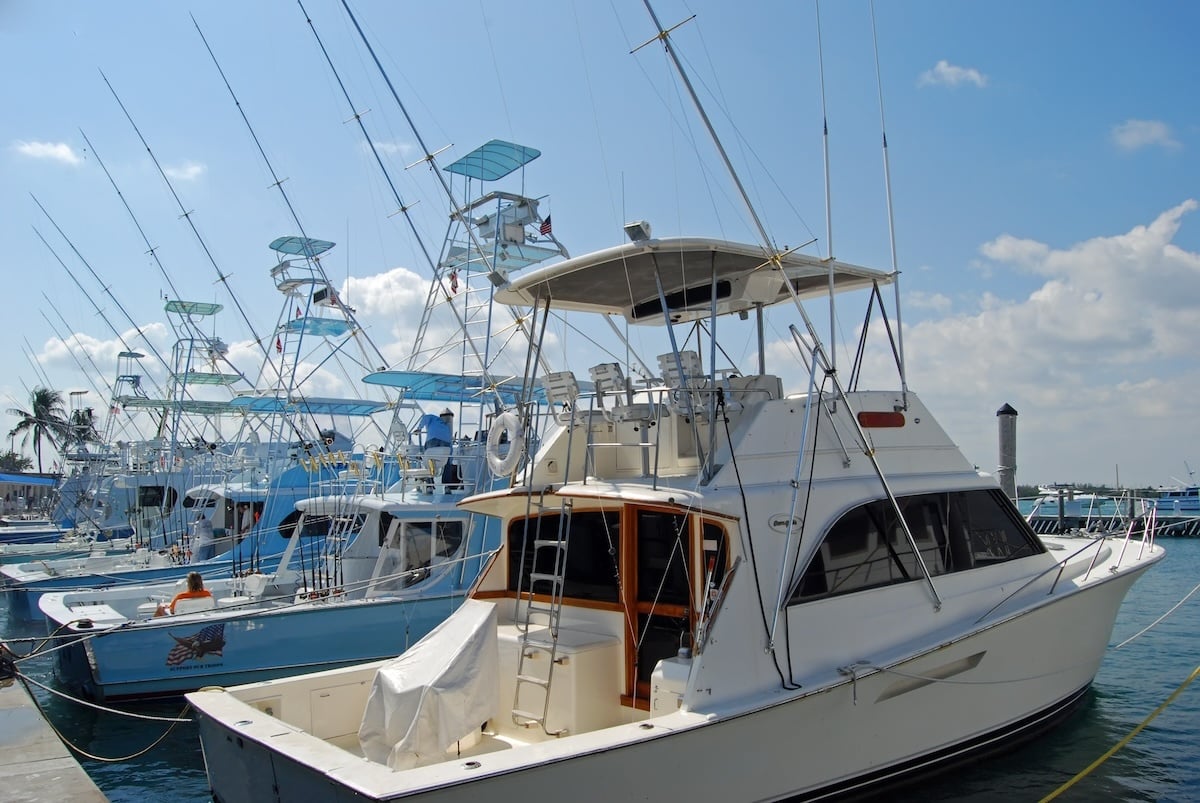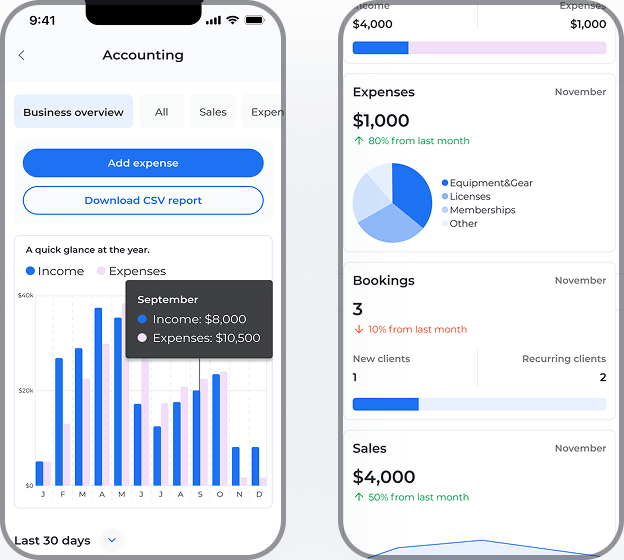Every fishing guide has a few stories about the trips that never happened.
The 5 a.m. no-show who swore he’d “Venmo you later.”
The family that bailed because of clouds in the forecast.
The group that canceled right after you filled the livewell and fueled up.
These last-second cancellations and no-shows can add up to hours of prep, bait, and fuel you’ll never get back. Multiply that over a season, and it’s the difference between a profitable summer and one that just covers the slip fees.
The real problem is the unpredictability. You can plan for slow fishing. You can’t plan for people who don’t even show up.
The Real Cost of No-Shows

When a client ghosts a booked trip, the loss isn’t just the fare. It can mean bait, fuel, crew pay, and the prime weekend you could have sold to someone else. For smaller operations, a single missed day can erase a week’s worth of profit. But larger operations can feel it too—when your crew relies on steady trips, one empty calendar block ripples through payroll and morale.
Some captains try to patch the problem by texting for deposits and sending out hand-typed reminders, but manual systems break down fast. Miss a confirmation call here and there, and sooner or later one slips through—the trip no one shows up for, or the one that was never really confirmed in the first place.
After enough reschedules, weather delays, and last-minute texts, booking software for fishing charters starts to make sense. It’s the guardrail that keeps your planning from spilling into wasted effort.
Example Scenario: The Saturday That Got Away
Every captain’s had that one Saturday—the forecast looked fine the night before, the boat's fueled up, and the bait's already in the livewell. Then the text comes: “Hey, can we rain-check?”
If you’ve been in the game long enough, you stop taking things like this personally. But that single message can burn half a day’s prep, a hundred dollars in bait, and the one prime slot you could have sold three times over. You can’t control people changing their minds, but you can control how the system responds.
That’s why having a setup that instantly applies the policy and logs the cancellation matters. You don’t spend Sunday morning arguing with clients over deposits—you just move on, keep the books straight, and focus on the next trip that’s actually going to happen.
Why The Old-School Booking Systems Fail So Often Today
Most fishing guides still keep track the simple way—text messages, handwritten notes, maybe a dry-erase board or a calendar tacked up somewhere that catches the day’s plans. (Well, that and a memory that holds more than it probably should.) That goes for captains running a six-pack charter, a flats skiff, or a fly-fishing guide service out of a truck bed. It feels personal and manageable, until it’s not.
When the season ramps up and weather changes plans every other day, that low-tech setup turns into a guessing game. You end up spending evenings scrolling through messages, trying to remember who booked which tide. The next morning, someone insists they had a spot that isn’t written anywhere. Unfortunately, that confusion doesn’t just burn time, it erodes trust. Guests start to sense disorganization long before they ever step aboard.
It’s not that captains suddenly forgot how to stay organized—it’s that the job changed. Bookings come from five different channels now, and clients expect instant replies—even from one-boat guides. If they don’t see availability or can’t reserve right away, they move on.
In other words, the old methods didn’t get worse. The pace of business just sped up around them.
Add to that:
- Everyone’s juggling more channels—text, email, Facebook, Instagram, DMs, sometimes booking requests through Google. It’s easy for one to slip through.
- Weather shifts faster in the social-media age; clients follow multiple forecasts and cancel preemptively at the first sign of clouds.
- Payment culture has changed—people don’t carry cash, they expect card payments and clear refund policies.
So, a manual system isn’t just harder to manage, it’s out of sync with how customers behave.
A structured booking system changes that dynamic completely. It timestamps every reservation, locks in deposits, and automates communication so the rules are clear before anyone clicks “Book.” It’s not about replacing the human touch in your business—it’s about protecting it by taking a lot of the administrative chaos off your plate.
How Automated Deposits Protect Prime Trip Days

Digital Sportsman’s booking engine was built around this exact problem. Each trip type—half-day, full-day, offshore, or custom—carries its own deposit requirement and cancellation window. Once a client reserves, the system immediately charges the deposit and confirms the terms in writing. There’s no chasing payments or awkward “reminder” calls; the policy enforces itself.
Those automated deposits do two things that matter:
- Commitment upfront. The client knows the trip is real, because they’ve got skin in the game.
- Instant protection for you. If weather forces a reschedule, the system rolls credit automatically. If they cancel late, the terms trigger without you lifting a finger.
For a guide running one boat, that means no more eating fuel costs on a Saturday. For a multi-vessel charter outfit, it means your entire crew schedule stays stable—no last-minute reshuffles, no lost morale.
Automated Reminders & Weather Updates Keep Clients Showing Up
Even with deposits in place, half the battle is communication. Most cancellations don’t happen because people are malicious; they happen because plans change, forecasts shift, or someone forgets the meeting point. Clear, consistent reminders close that gap.
Online booking software for fishing charterscan handle reminders automatically. Each reservation triggers a short sequence: a confirmation at booking, a reminder a few days before the trip, and another one the evening prior. Clients see the launch time, dock location, and weather details all in one message. It’s simple, but it dramatically cuts down on missed departures.
When weather turns questionable, automation helps there too. Instead of sending twenty individual texts while watching the radar, a captain can push one update through the system and notify every group scheduled for that day. That keeps expectations realistic and gives clients confidence that you’re on top of conditions.
The tone of those automated messages matters more than people realize. Short, factual notes—no emojis, no filler—read as professional and trustworthy. They set the expectation that this is a real business with policies, not a side gig running on texts. Over time, that consistency trains clients to take each message seriously.
Setting Clear Policies Without Sounding Harsh

One of the hardest parts of running a charter is enforcing rules without feeling like the bad guy. You want to keep repeat clients happy, of course, but you also can’t afford to lose money every time someone changes their mind.
When the deposit and cancellation terms are shown up front—before a client even clicks Book—there’s less tension later. People see exactly what happens if they back out late or show up short on the deposit. It’s clear, neutral, and fair.
A good system makes that transparency automatic. Each booking confirmation includes the agreed terms, so you never have to re-send them or dig through messages to prove what was said. If there’s ever a dispute, you’ve got a timestamped record showing that every policy was displayed and accepted. That level of documentation protects both sides without extra admin work.
Reducing Same-Day Confusion
Most no-shows aren’t total disappearances—they’re timing errors. Someone reads 6 a.m. as 6 p.m., or goes to the wrong marina. That’s why same-day reminders are often more valuable than deposits. A quick message at 4 a.m. confirming “Departing from the east dock at 6 a.m.” can save a lost morning.
Digital Sportsman’s automation covers that, too. Captains can customize how far out those messages send—12 hours, 4 hours, even an hour before launch. It’s a small feature, but it replaces a dozen calls when you should be loading gear.
Even better, once you set the rules and schedule once, the system repeats them perfectly. Every trip, every guest, every season—identical accuracy, no mental load. Over time, that steadiness builds reliability your clients notice.
Weather Reschedules

Bad weather is part of the business, but it doesn’t have to wreck the schedule. When storms move through or seas build beyond what’s safe, rescheduling quickly and fairly becomes the difference between keeping trust and losing repeat clients.
A well-designed online booking system for fishing guides makes that process nearly frictionless. Once a trip is postponed, the system automatically notifies the client, holds their deposit as credit, and opens replacement dates on your calendar. That means you’re not having to re-enter data, chase down texts, or remember to refund one person while rescheduling another. The terms you already set handle the logic in the background.
Other Things to Consider
Crew Stability
Deckhands, mates, and support staff depend on predictable income. When trips vanish without process, morale takes the hit. Having each cancellation instantly logged and credited keeps everyone clear about which days are live, which are pending, and which have been moved. It turns what used to be a messy chain of calls into a clear workflow visible to everyone involved.
The software also keeps records that matter later. If a client disputes a late-cancellation charge, you can show exactly when the weather alert went out, what reschedule options were offered, and when the policy triggered. That kind of documentation saves reputation and revenue in equal measure.
Learning from Patterns

Once you’ve run a full season through a digital system, patterns start to appear. You can see which weekends historically get the most cancellations, how far in advance people tend to cancel, and whether certain trip types are riskier than others.
That information is operational leverage. It tells you where to tighten policies, when to raise deposits, and which dates deserve stricter terms. Over time, that data makes your policies feel less arbitrary and more evidence-based, which clients actually appreciate.
And the reason clients appreciate it is that it feels transparent and rational. Policies based on data and experience (e.g. “Our August policy is stricter due to frequent weather cancellations”) seem professional, not arbitrary. It signals that you’ve thought it through and that your goal is to keep trips running smoothly for everyone involved. Most clients understand that those type of policies protect both sides. It shows you’re running a serious, professional fishing guide service that values reliability and fairness.
A good real-world example of the opposite—a policy that feels arbitrary or emotional instead of grounded in data—would be something like this:
“All cancellations for any reason lose the full deposit, no exceptions.”
On paper, that sounds firm. In practice, it comes across as reactionary. It doesn’t account for predictable realities like seasonal storms, mechanical issues, or clients who genuinely give plenty of notice.
Another common version:
“Full refund if canceled 24 hours in advance.”
That one sounds fair, but isn’t thought through. For a fishing guide, 24 hours isn’t enough time to fill an open spot, especially on weekends. It’s generous in the wrong direction—built around convenience, not the economics of running a trip.
Both examples feel arbitrary because they’re not linked to how the business actually runs. They’re either too strict or too lenient, written from frustration or habit rather than from what the data says about real cancellation behavior.
A lot of captains who switch from manual tracking to an online booking platform will probably notice the same thing: the stress level drops. They’re no longer improvising policy by text or trying to remember who paid what after a storm front ruins the forecast. Each decision has a record behind it.
Balancing Flexibility and Protection
Cancellations are part of running a fishing guide service. The challenge is finding a middle ground between being fair to your clients and protecting your time.
Clear late cancellation/no-show policies combined with automated systems can hold that line for you, without the usual friction—i.e. awkward refund conversations, chasing payments, arguing over who said what. The terms apply automatically, which keeps the relationship professional and the process consistent even when plans change.
If the weather truly makes it unsafe, credits or reschedules process automatically. If the client cancels without cause, the policy you agreed on applies automatically. You’re not negotiating over text or waiting days for a response—the rules execute cleanly and predictably.
That predictability doesn’t just save money; it builds trust. Clients see consistent handling across every trip, and your crew sees you running a tight, professional operation. When both sides feel that steadiness, you start the next season on solid footing instead of trying to recover from last year’s chaos.
Integrating Deposits, Payments, and Accounting

When everything—bookings, deposits, and payments—runs through one system, a lot of the busywork simply disappears. Instead of keeping one app for scheduling fishing trips and another for accounting, every transaction is tied to the trip it belongs to.
The moment a booking closes out, the payment record is already there for accounting.
That linkage is what turns booking software from a convenience into infrastructure. You stop having to reconcile spreadsheets at the end of the month. Tax prep isn’t a scramble to match names with dates. If a client calls about a refund or balance, you can see the entire paper trail in a few clicks.
It’s a kind of control that many fishing guides don’t realize they were missing until it’s there.
Fewer Surprises, More Fishing
The goal isn’t to hand the business over completely to automation. It’s to build a framework that keeps the day predictable when everything else—the tide, the weather, the fuel bill—refuses to cooperate. Once deposits, reminders, and cancellations are handled automatically, you get back the part of the job that actually matters: being on the water.
A solid system doesn’t replace experience or personality; it supports them. Clients remember a guide who runs a trip smoothly, not one who spends the ride back juggling texts. The fewer distractions between you and the work, the more professional the whole operation feels.
About Digital Sportsman
All-in-One Booking Software & Management Platform for Fishing Guides & Charters
Digital Sportsman was built for this exact type of operator—the one running a fishing guide business, not a hobby. It combines booking, client communication, resource scheduling, and accounting into one connected workflow. There’s no juggling five different platforms or relying on a patchwork of apps that don’t talk to each other.
For most captains, that means a season with fewer surprises: more bookings, fewer no-shows, clearer policies, cleaner books, and steadier income. It’s not about adding technology for its own sake—it’s about trimming the friction out of every trip so you can focus on the part nobody else can do: running the boat.
%20(1).png?width=349&height=75&name=DSman%20logo%20blue%20dark%201200%20(1)%20(1).png)

